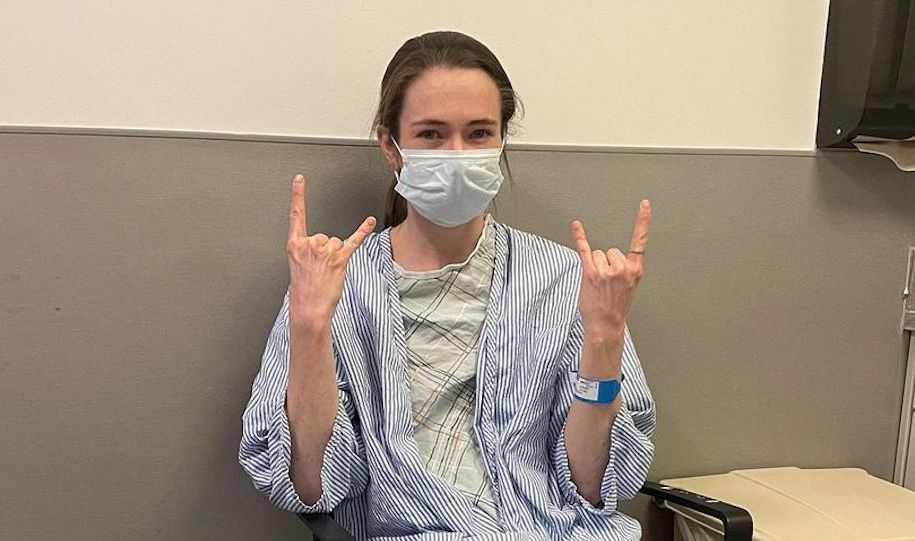“I was not in the age group”, Woman says the canker sore on the back of her tongue wouldn’t go away and she thought it was a COVID-19 symptom until she was diagnosed with an unusual type of cancer

Doctors say that canker sores often go away on their own. But, for the 35-year-old woman, that was not the case. The woman said that she noticed a canker sore on the back of her tongue that wouldn’t go away. She thought it was a COVID-19 symptom. But, as time passed, the pain increased and she went to see a doctor. The medical personnel prescribed antibiotics for what they thought was a cold sore. The 35-year-old dancer said that the antibiotics made her feel better, but the discomfort returned. She was eventually diagnosed with tongue cancer.
The 35-year-old dancer from New York City, Katie Drablos, told TODAY: “I was not in the age group or having lived a life that would leave me to be privy to something like oral cancer. By sharing my story maybe someone can feel less alone and feel more able to express their feelings and reach out if they need help so we can all get through the tough days and keep finding joy.”
The 35-year-old woman said that she couldn’t see the canker sore. Doctors told her that it was a tiny spot on the back-left side of her tongue. At first, the woman only felt painful every once in a while.
In January 2021, the pain was almost constant, Drablos said.
During an interview with TODAY, the 35-year-old woman reportedly said:
“What was visible on the outside of my tongue was this sore that was weird looking. Because of the placement it was hard for me to see it. If it had been on the tip of my tongue I’d probably would have been like, ‘Oh that doesn’t exactly look like a normal canker sore.'”
Drablos then went to a hospital and the medical personnel prescribed antibiotics for what he thought was a cold sore.
According to the health officials, cold sores are caused by the herpes simplex virus type 1 and can develop inside and outside of the mouth, while the cause of canker sores is not known, and they’re only found inside the mouth.
Drablos said that the antibiotics made her feel better. Unfortunately, the discomfort returned.
The 35-year-old woman also said:
“I came home from teaching, and my throat was hurting a little bit. I was like, ‘I need to go to the doctor again because this isn’t going away.'”
Drablos made an appointment to see Dr. Diana Kirke, an otolaryngologist at New York Eye and Ear Infirmary of Mount Sinai.
During an interview with TODAY, Dr. Diana Kirke reportedly said:
“We’ve started to see anecdotally in the last 10 years … a shift to a younger age group, and by younger, I mean below the age of 40, unrelated to previous drinking and smoking history. Early evidence suggests that this rise is true, but we actually don’t have all the data to say it’s true.
We are doing some research, trying to look more broadly at whether we’re actually seeing a rise in cancer in the younger age group and understand where it’s rising and why.”
According to TODAY, the biopsy results indicated Drablos had tongue cancer. The follow-up scan did not detect any cancer outside of her tongue.
In March 2021, the 35-year-old woman underwent the life-saving surgery. But, she received bad news on April 1. The doctor called her and told the woman that they found cancer in her neck, meaning she actually was at stage 4.
Drablos reportedly said: “The surgery affected so many parts of my body. The flap they used to reconstruct my tongue involved major surgery on my left arm, and then they grafted with skin from my left leg.”
Because the cancer was stage 4, the 35-year-old dancer also underwent radiation and chemotherapy.
The woman said that she suffered burns from the radiation on her neck. She finished the treatment in June 2021. The woman said that because her tongue has muscles from her arm, it doesn’t work as naturally. Now, she struggles with eating, drinking and speaking. But, the good news is that she has been able to return to dancing.
The 35-year-old woman also said:
“My body is magnificent, how it can heal. I’ll feel really sad about some of the losses but then also incredibly grateful and with a deeper sense of gratitude than I ever had pre-cancer. Dancing has been the best medicine, keeping me mentally feeling like myself, being able to express my emotions.”
